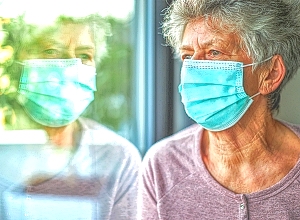In a study of adults from the Zurich general population who were infected with COVID-19 in 2020, more than a quarter report not having fully recovered after six to eight months, reports MedicalBrief.
Those findings were described this week in the open-access journal PLOS ONE by Milo Puhan and colleagues at the University of Zurich, Switzerland.
While initial public health responses to the SARS-CoV-2 virus focused on reducing the acute burden of COVID-19, a growing body of evidence indicates that the infection can also result in longer-term physical and mental health consequences. These long-term consequences, currently referred to as “post-COVID-19 syndrome” or “Long COVID”, are of increasing concern for healthcare systems.
In the new study, researchers recruited 431 participants from within the contact tracing system in Zurich. All had tested positive for SARS-CoV-2 between February and August 2020, and completed an online questionnaire about their health a median of 7.2 months after their diagnosis. Symptoms had been present at diagnosis in 89% of the participants and 19% were initially hospitalised. Compared to individuals not participating in the study, participants were younger, with an average age of 47.
Overall, 26% of participants reported that they had not fully recovered at six to eight months after initial COVID-19 diagnosis: 55% reported symptoms of fatigue, 25% had some degree of shortness of breath, and 26% had symptoms of depression. A higher percentage of females and initially hospitalised patients reported not having recovered, compared to males and non-hospitalised individuals. A total of 40% of participants reported at least one general practitioner visit related to COVID-19 after their acute illness. The authors say their findings underscore the need for the timely planning of resources and patient services for post-COVID-19 care.
"This cohort study based on a representative, population-based sample of SARS-CoV-2 infected individuals found that 26% did not fully recover within six to eight months after diagnosis and 40% had at least one further healthcare contact related to COVID-19," they added. "The findings underline the need for the timely planning of healthcare resources and services tailored to the needs of individuals suffering from post-COVID-19 syndrome."
Study details
Burden of post-COVID-19 syndrome and implications for healthcare service planning: A population-based cohort study
Dominik Menges , Tala Ballouz, Alexia Anagnostopoulos, Hélène Aschmann, Anja Domenghino, Jan S. Fehr, Milo A. Puhan
Published in PLOS ONE Journal, 12 July 2021
Abstract
Background
Longer-term consequences after SARS-CoV-2 infection are becoming an important burden to societies and healthcare systems. Data on post-COVID-19 syndrome in the general population are required for the timely planning of healthcare services and resources. The objective of this study was to assess the prevalence of impaired health status and physical and mental health symptoms among individuals at least six months after SARS-CoV-2 infection, and to characterise their healthcare utilisation.
Methods
This population-based prospective cohort study (Zurich SARS-CoV-2 Cohort) enrolled 431 adults from the general population with polymerase chain reaction-confirmed SARS-CoV-2 infection reported to health authorities between 27 February 2020 and 5 August 2020 in Zurich, Switzerland. We evaluated the proportion of individuals reporting not to have fully recovered since SARS-CoV-2 infection, and the proportion reporting fatigue (Fatigue Assessment Scale), dyspnea (mMRC dyspnea scale) or depression (DASS-21) at six to eight months after diagnosis. Furthermore, the proportion of individuals with at least one healthcare contact after their acute illness was evaluated. Multivariable logistic regression models were used to assess factors associated with these main outcomes.
Results
Symptoms were present in 385 (89%) participants at diagnosis and 81 (19%) were initially hospitalised. At six to eight months, 111 (26%) reported not having fully recovered. 233 (55%) participants reported symptoms of fatigue, 96 (25%) had at least grade 1 dyspnea, and 111 (26%) had DASS-21 scores indicating symptoms of depression. 170 (40%) participants reported at least one general practitioner visit related to COVID-19 after acute illness, and 10% (8/81) of initially hospitalised individuals were rehospitalised. Individuals that have not fully recovered or suffer from fatigue, dyspnea or depression were more likely to have further healthcare contacts. However, a third of individuals (37/111) who have not fully recovered did not seek further care.
Conclusions
In this population-based study, a relevant proportion of participants suffered from longer-term consequences after SARS-CoV-2 infection. With millions infected across the world, our findings emphasise the need for the timely planning of resources and patient-centered services for post-COVID-19 care.
See more from MedicalBrief archives:
Catching up to ‘Long COVID’ — Diagnostic and treatment information, at last
COVID-19's cognitive cost may be equivalent to 10-years ageing — UK intelligence test data
Persistence of at least one symptom in almost 90% of recovered COVID-19 Italian patients
Concerns about lasting heart damage in COVID-19 patients — 2 German studies

